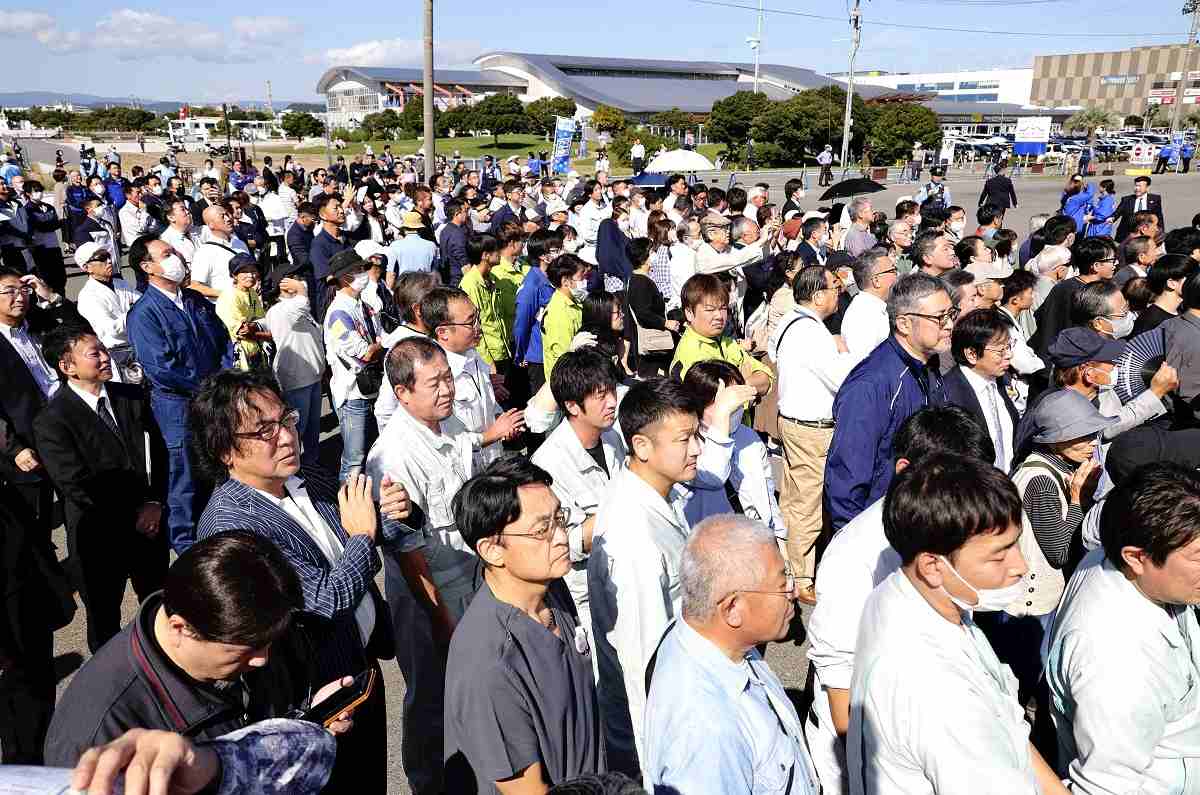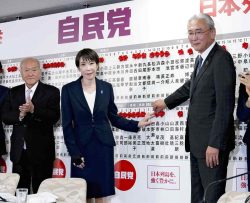Japan’s LDP Pledges in Lower House Race to Boost Economy; Opposition Parties Promise to Cut Consumption Tax

People listen to a House of Representatives election candidate in Iwaki, Fukushima Prefecture, on Tuesday.
17:50 JST, October 15, 2024
The ruling and opposition parties are at odds over economic policy but largely on the same page about the need for political reform at the start of the campaign period for the lower house election, which was formally announced on Tuesday.
The main issues in the election are the economy, including measures to combat rising prices; political reform in response to money in politics issues involving Liberal Democratic Party factions; and diplomacy and security policy.
According to their campaign pledges, the parties differ on policy for tax cuts, specific political reforms and strengthening Japan’s defenses.
Economic policy
With high prices a pressing issue, both the LDP and Komeito have pledged to “safeguard people’s way of life” through the provision of benefits to low-income households, which have been particularly hard hit by inflation, and through measures related to electricity and gas bills.
The LDP has stressed that it aims for “an economy that moves force in a virtuous cycle of growth and distribution,” to be achieved through measures such as capital investment.
For their part, opposition parties have promised significant tax cuts.
The Constitutional Democratic Party of Japan has not explicitly pledged to lower the consumption tax, as it did in the previous national election, but it has proposed the introduction of a “refundable tax credit system that combines benefits and tax cuts” for low- and middle-income earners.
The Japan Innovation Party has pledged to cut the consumption tax to 8%, while the Japanese Communist Party and the Democratic Party for the People have both proposed slashing it to 5%. Meanwhile, Reiwa Shinsengumi has called for the consumption tax to be abolished, and the Social Democratic Party has proposed dropping the consumption tax to 0% for three years. Sanseito has also called for tax cuts.
Political reform
While both the ruling and opposition parties agree on the need for political reform, they differ in the specifics of their plans.
The CDPJ, the JIP, Komeito and the DPFP have all called for the abolition of the political activity funds given by political parties to Diet members.
The LDP stated that it will work to ensure transparency for the funds and establish a third-party auditing organization, with an eye toward abolishing the funds in the future.
As to “survey, research, public relations and accommodation expenses,” previously known as “document, correspondence, travel and accommodation expenses,” the ruling and opposition parties are almost on the same page, pledging to disclose how the funds are used.
The LDP pledged it would “work to clarify use of funds, make public their use, and return any unused funds to the national treasury,” while Komeito made a more specific commitment, stating it would “aim to make the necessary changes by the ordinary Diet session next year at the latest.”
The CDPJ, JIP and JCP have called for a ban on donations from companies and organizations, and pledged to prohibit such groups from buying tickets to political fundraising parties. The DPFP has called for strict regulations on political fundraising parties.
Foreign, security policies
Regarding the U.S.-Japan alliance, the LDP, Komeito, the CDPJ, the JIP and the DPFP have all pledged to maintain the alliance, while the JCP opposes strengthening the alliance.
In its campaign pledges, the LDP decided not to explicitly mention an “Asian version of NATO” — a signature idea of LDP Prime Minister Shigeru Ishiba.
Instead, the party limited its pledge to “promoting bilateral and multilateral defense cooperation and exchanges, while ensuring regional security and stability.”
As to strengthening Japan’s defenses, the LDP, JIP and DPFP have all expressed their support.
Top Articles in Politics
-

Japan PM Takaichi’s Cabinet Resigns en Masse
-

Sanae Takaichi Elected Prime Minister of Japan; Keeps All Cabinet Appointees from Previous Term
-

Japan’s Govt to Submit Road Map for Growth Strategy in March, PM Takaichi to Announce in Upcoming Policy Speech
-

LDP Wins Historic Landslide Victory
-

LDP Wins Landslide Victory, Secures Single-party Majority; Ruling Coalition with JIP Poised to Secure Over 300 seats (UPDATE 1)
JN ACCESS RANKING
-

Japan PM Takaichi’s Cabinet Resigns en Masse
-

Japan Institute to Use Domestic Commercial Optical Lattice Clock to Set Japan Standard Time
-

Israeli Ambassador to Japan Speaks about Japan’s Role in the Reconstruction of Gaza
-

Man Infected with Measles Reportedly Dined at Restaurant in Tokyo Station
-

Videos Plagiarized, Reposted with False Subtitles Claiming ‘Ryukyu Belongs to China’; Anti-China False Information Also Posted in Japan






















